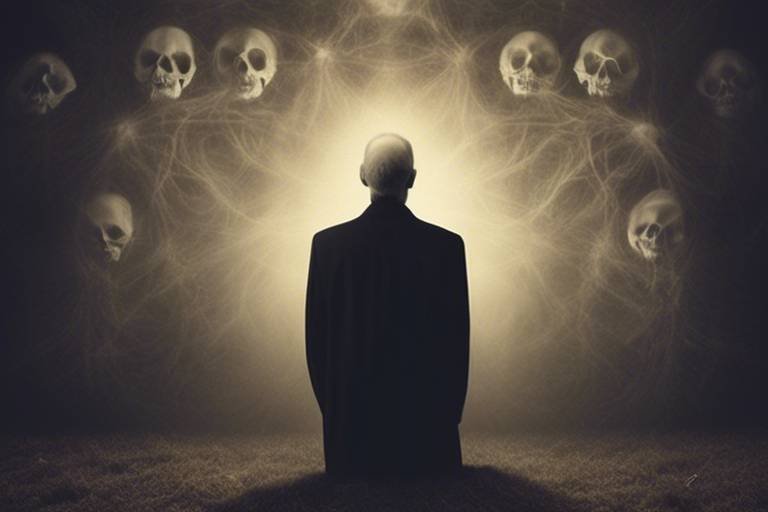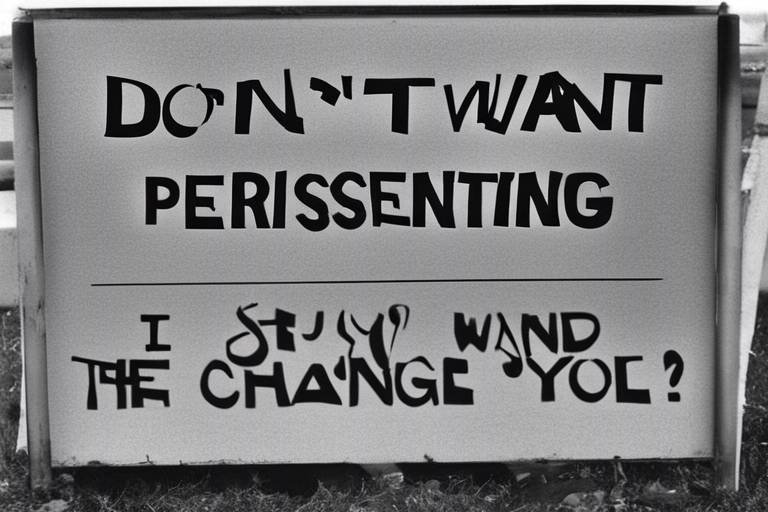Can Metaphysics Answer Questions About Death?
Death is perhaps the most profound mystery that humanity grapples with. As we journey through life, we often find ourselves pondering the ultimate questions: What happens after we die? Is there a purpose to our existence in the face of mortality? Can metaphysics, the branch of philosophy that explores the fundamental nature of reality, provide us with answers? In this article, we will embark on an exploration of these deep inquiries, examining how metaphysical perspectives can illuminate our understanding of death and existence.
Metaphysics invites us to consider the essence of being and the nature of existence itself. By probing into these questions, we can begin to unravel the complexities surrounding death. For instance, when we think about what it means to exist, we might ask ourselves: Are we merely biological organisms, or is there something more—perhaps a soul or consciousness that transcends our physical form? This inquiry not only shapes our understanding of life but also profoundly influences how we perceive death.
Throughout history, various philosophical schools have offered differing views on death, each contributing unique interpretations and implications for the living. Existentialism, with its focus on individual experience, challenges us to confront the inevitability of death and to find meaning in our existence despite its transient nature. On the other hand, nihilism presents a stark perspective, suggesting that death is the end of all meaning, leaving us to grapple with the void it creates. By examining these philosophical lenses, we can gain a richer understanding of how death impacts our lives and the choices we make.
As we delve deeper into metaphysical theories surrounding the afterlife, we encounter intriguing concepts such as reincarnation and spiritualism. Reincarnation posits that our souls are reborn into new bodies, suggesting a continuity of existence beyond our current life. In contrast, spiritualism argues that consciousness persists after death, offering a hopeful perspective that we are more than just our physical selves. These theories not only shape our beliefs about what happens after we die but also influence how we live our lives today.
Ultimately, the role of mortality in human experience cannot be overstated. Our awareness of death acts as a catalyst for reflection, prompting us to evaluate our values, relationships, and the meaning we derive from our existence. By understanding that our time is finite, we may be inspired to live more authentically and purposefully. Thus, the questions surrounding death are not merely abstract philosophical inquiries; they are deeply intertwined with our everyday lives and experiences.
- What is metaphysics? Metaphysics is a branch of philosophy that studies the fundamental nature of reality, including concepts such as existence, being, and the universe.
- Can metaphysics provide answers about life after death? While metaphysics offers various theories and perspectives about life after death, definitive answers remain elusive and often depend on personal beliefs.
- How do different philosophies view death? Existentialism emphasizes personal meaning in the face of death, while nihilism views death as the end of meaning. Other philosophies may offer different interpretations.
- What is the significance of understanding death? Understanding death can enrich our appreciation of life, prompting us to live more fully and authentically.

The Nature of Existence
Understanding existence is key to metaphysical discussions about death. It raises profound questions about what it means to be alive and how we perceive the world around us. At its core, existence is not merely about being; it encompasses the essence of our experiences, our interactions, and our consciousness. Have you ever paused to consider what it truly means to exist? It’s more than just occupying space or breathing; it’s about the richness of our experiences, the emotions we feel, and the connections we forge with others.
Existence can be likened to a vast tapestry, woven from countless threads of experiences, beliefs, and perceptions. Each thread represents a unique aspect of life, contributing to the overall picture of who we are. This intricate design prompts us to reflect on our own lives and the choices we make. Are we merely existing, or are we truly living? This distinction is crucial as it influences how we approach life and, ultimately, how we confront death.
To further understand this concept, let’s explore some fundamental aspects of existence:
- Consciousness: Our awareness of ourselves and the world around us is a defining feature of existence. It allows us to reflect, question, and derive meaning from our experiences.
- Interconnectedness: We exist in relation to others. Our interactions shape our identity and influence our understanding of life and death.
- Temporal Nature: Existence is fleeting. The awareness of time passing compels us to consider how we spend our days and what legacy we leave behind.
These components of existence are not just philosophical musings; they have real implications for how we live our lives. For instance, the awareness of our consciousness can lead us to seek deeper connections and experiences, while recognizing our interconnectedness can inspire empathy and compassion. Moreover, the temporal nature of existence often ignites a desire to make the most of our time, prompting us to pursue passions and relationships that enrich our lives.
In the realm of metaphysics, the nature of existence is often debated. Some philosophers argue that existence itself is an illusion, while others contend that it is the foundation of reality. This divergence leads us to consider: if existence is indeed real, what does that mean for our understanding of death? Does the end of existence signify the end of consciousness, or is there something more beyond the physical realm? These questions open up a rich dialogue about the implications of our existence and the mysteries that lie beyond death.
Ultimately, grappling with the nature of existence allows us to confront our mortality with a sense of purpose and clarity. It encourages us to reflect on what it means to live authentically and to find meaning in our experiences. As we delve deeper into the philosophical inquiries surrounding death, we begin to appreciate how our understanding of existence profoundly shapes our perceptions of life, death, and everything in between.

Philosophical Perspectives on Death
When we dive into the philosophical waters surrounding death, we find ourselves navigating a sea of diverse thoughts and beliefs. Each philosophical school offers a unique lens through which to view the end of life, presenting ideas that challenge our understanding and provoke deep reflection. From existentialism's focus on individual experience to nihilism's stark acceptance of meaninglessness, these perspectives shape how we confront our mortality.
Existentialism, for example, is a philosophy that places the burden of meaning squarely on the shoulders of the individual. Thinkers like Jean-Paul Sartre and Martin Heidegger explored the implications of death on personal existence. They argued that the awareness of our inevitable demise compels us to create our own meaning and purpose. In a world where death looms large, existentialists encourage us to confront our fears and embrace the freedom that comes with acknowledging our mortality.
On the flip side, nihilism presents a more unsettling view. It posits that life is ultimately devoid of inherent meaning, and death simply marks the end of our existence. Nihilists argue that since life lacks objective significance, our struggles and achievements ultimately fade into nothingness. This perspective can be both liberating and daunting. It frees individuals from societal expectations but also leaves them grappling with the void that follows death. How do we find comfort in a reality where nothing truly matters?
To illustrate these contrasting perspectives, consider the following table that summarizes key philosophical views on death:
| Philosophy | View on Death | Implications for Life |
|---|---|---|
| Existentialism | Death as a catalyst for creating personal meaning | Encourages authenticity and individual responsibility |
| Nihilism | Death as the end of all meaning | Leads to existential despair or liberation from societal norms |
As we explore these philosophical perspectives, we begin to realize that our understanding of death is not merely an academic exercise; it profoundly influences how we live our lives. The questions raised by these schools of thought push us to reflect on our values, relationships, and the legacies we wish to leave behind. What does it mean to live authentically in the face of death? How can we find solace in the absurdity of existence? These inquiries are not just theoretical; they resonate deeply with our daily experiences.
Ultimately, the philosophical perspectives on death invite us to engage with our mortality in a meaningful way. They challenge us to confront our fears, embrace our freedoms, and seek out the significance we desire in our lives. As we journey through these complex ideas, we may discover that our understanding of death can illuminate our path toward a richer, more fulfilling existence.
- What is existentialism's view on death? Existentialism sees death as a catalyst for individuals to create their own meaning and purpose in life.
- How does nihilism interpret death? Nihilism views death as the end of all meaning, leading to a perspective that life lacks inherent significance.
- Can understanding death change how we live? Yes, engaging with philosophical perspectives on death can profoundly influence our values, choices, and relationships.

Existentialism and Death
Existentialism confronts the reality of death head-on, inviting us to reflect on our own existence and the choices we make in the face of our mortality. This philosophical movement, which gained prominence in the 20th century, emphasizes individual experience, freedom, and the inherent responsibility that comes with being alive. Think about it: how often do we pause to consider the fleeting nature of life? Existentialist thinkers, such as Jean-Paul Sartre and Martin Heidegger, challenge us to grapple with this uncomfortable truth. They remind us that, while death is inevitable, it also serves as a catalyst for creating meaning in our lives.
In the existentialist view, death is not merely an endpoint; it's a profound aspect of our existence that shapes our identity and choices. When we acknowledge that our time is limited, we are compelled to live authentically and with purpose. This perspective can be both liberating and daunting. It encourages us to embrace our freedom to choose, while simultaneously reminding us of the weight of those choices. After all, each decision we make is a reflection of how we want to navigate the inevitable journey toward death.
Existentialists argue that the awareness of death ignites a sense of urgency in our lives. It prompts us to ask ourselves critical questions: Are we living to our fullest potential? Are we pursuing what truly matters to us? This confrontation with mortality can lead to a more profound appreciation for the present moment. In essence, existentialism teaches us that while death may render life absurd, it also provides us with the impetus to create our own meaning. As Sartre famously stated, “Existence precedes essence,” emphasizing that we are not defined by a predetermined purpose but by the choices we make.
To further illustrate the impact of existentialism on our understanding of death, let’s take a closer look at two key figures: Heidegger and Sartre.
| Philosopher | Key Concept | Implication for Death |
|---|---|---|
| Martin Heidegger | Being-toward-death | Awareness of mortality shapes our authenticity and purpose. |
| Jean-Paul Sartre | The Absurd | Life’s inherent lack of meaning challenges us to define our own purpose. |
Heidegger's concept of Being-toward-death posits that our understanding of existence is fundamentally linked to our awareness of mortality. He suggests that by confronting our inevitable end, we can live more authentically. This idea encourages us to shed societal expectations and embrace our true selves. In contrast, Sartre's notion of the absurdity of death pushes us to acknowledge that life lacks inherent meaning, which can be both liberating and unsettling. It challenges us to create our own significance in a world that often feels chaotic and indifferent.
Ultimately, existentialism teaches us that while death may be the great equalizer, it is also a profound motivator. By embracing the reality of our mortality, we can cultivate a deeper appreciation for life, make more intentional choices, and strive to live authentically. So, the next time you find yourself pondering the meaning of life, remember: it’s the awareness of death that can truly illuminate your path.
- What is existentialism? Existentialism is a philosophical movement that emphasizes individual existence, freedom, and choice, often focusing on the inherent meaninglessness of life.
- How does existentialism relate to death? Existentialism views death as a crucial aspect of human existence that compels individuals to create their own meaning and live authentically.
- Who are key figures in existentialism? Notable existentialist thinkers include Jean-Paul Sartre, Martin Heidegger, and Simone de Beauvoir, each offering unique insights into the human condition and mortality.

Heidegger's Being-toward-Death
Heidegger's concept of Being-toward-death is a profound exploration of how the awareness of our mortality shapes our existence. He argues that recognizing our inevitable end is not merely a source of anxiety but rather a crucial aspect of authentic living. When we confront the reality of death, we are compelled to examine our lives more closely, to understand what it truly means to exist. This confrontation can lead us to a deeper appreciation of the present moment, urging us to live more fully and intentionally.
In Heidegger's view, many people live in a state of inauthenticity, distracted by the mundane aspects of life and the expectations of society. It's only when we acknowledge death that we can break free from this distraction. This awareness serves as a catalyst, prompting us to ask ourselves essential questions about our values, our relationships, and the legacy we wish to leave behind. In this way, death becomes a powerful motivator for living authentically.
Heidegger also emphasizes the idea of individuality in the face of death. Each person's encounter with mortality is unique, and this personal experience shapes our understanding of existence. He posits that by embracing our individual mortality, we can cultivate a more genuine connection to ourselves and others. The realization that we are all on a finite journey can foster empathy and solidarity among individuals, as we share this common fate.
Moreover, Heidegger's insights reveal that death is not just an end but also a transformative experience. It forces us to confront our fears and uncertainties, ultimately leading to a richer understanding of life itself. By engaging with the concept of Being-toward-death, we can learn to prioritize what truly matters, shedding superficial concerns and focusing on meaningful experiences.
To summarize, Heidegger's Being-toward-death invites us to:
- Recognize the significance of our mortality.
- Live authentically by aligning our actions with our true values.
- Embrace individuality in our experiences of death.
- Transform our understanding of life through the lens of mortality.
In essence, Heidegger challenges us to view death not as something to be feared but as an integral part of our existence that enriches our understanding of what it means to be alive. By embracing this philosophy, we can live more authentically, making choices that resonate with our true selves and fostering deeper connections with those around us.
- What is Being-toward-death?
Being-toward-death is a concept by philosopher Martin Heidegger, which suggests that awareness of our mortality influences how we live our lives, pushing us toward authenticity. - How does Heidegger's philosophy affect our understanding of life?
Heidegger's philosophy encourages us to confront our mortality, leading to a greater appreciation of life and prompting us to live more intentionally. - Can recognizing death improve relationships?
Yes, acknowledging our shared mortality can foster empathy and deeper connections with others, as it highlights our common human experience.

Being-toward-death
This article explores the philosophical inquiries surrounding death through the lens of metaphysics, examining various theories and perspectives that seek to provide insight into this profound aspect of human existence.
Understanding existence is key to metaphysical discussions about death. This section delves into what it means to exist and how this concept influences our perception of life and death.
Various philosophical schools offer differing views on death. This section compares existentialism, nihilism, and other philosophies, highlighting their unique interpretations of death's significance and implications for the living.
Existentialist thinkers emphasize individual experience and choice in the face of death. This subsection examines how existentialism confronts the inevitability of death and the responsibility of creating meaning in life.
Heidegger's concept of suggests that awareness of mortality shapes our existence in profound ways. Imagine standing at the edge of a vast canyon, the abyss representing the unknown of death. This awareness compels us to reflect on our lives and the choices we make. Heidegger argues that by embracing our mortality, we can lead more authentic lives. It’s as if our mortality is a spotlight, illuminating the path of our existence and urging us to confront the questions that truly matter.
In this framework, being-toward-death is not merely about the end of life; it’s about how the anticipation of death enriches our experiences. When we acknowledge that life is finite, we are encouraged to seize opportunities, cultivate relationships, and seek out genuine experiences. The realization that time is limited can instill a sense of urgency, pushing us to prioritize what truly matters. This perspective can be both liberating and daunting, as it challenges us to reflect on our values and the legacy we wish to leave behind.
Heidegger also posits that many people live in a state of inauthenticity, distracted by societal norms and expectations. They often avoid contemplating death, which leads to a superficial existence. By contrast, those who embrace being-toward-death can live authentically, making decisions based on personal values rather than external pressures. This authenticity fosters a deeper connection to life, as individuals become more aware of their unique paths and the significance of their choices.
Moreover, being-toward-death encourages a profound appreciation for the present moment. It teaches us that life is not just about the destination, but the journey itself. As we navigate through life, we learn to cherish each experience, no matter how small, because we recognize that these moments contribute to the tapestry of our existence.
Sartre argues that death renders life absurd, challenging us to find personal meaning. This subsection discusses how this perspective affects our approach to living and dying.
Nihilism presents a stark view of death as the end of meaning. This section explores nihilistic interpretations and their impact on how individuals cope with the concept of mortality.
Metaphysics often speculates on the afterlife, proposing various theories about what happens after death. This section examines different metaphysical beliefs and their implications for understanding death.
Reincarnation posits that the soul is reborn into new bodies. This subsection discusses the philosophical underpinnings of reincarnation and its implications for how we view life and death.
Spiritualism suggests that consciousness continues after death. This section explores metaphysical arguments supporting the idea of an enduring self beyond physical existence.
Mortality shapes human experience and values. This section discusses how awareness of death influences our choices, relationships, and the pursuit of meaning in life.
- What is Being-toward-death?
Being-toward-death is a concept by philosopher Martin Heidegger that emphasizes the importance of acknowledging our mortality in order to live authentically and meaningfully. - How does awareness of death affect our lives?
Awareness of death can encourage us to prioritize meaningful experiences, make authentic choices, and appreciate the present moment. - What is the difference between existentialism and nihilism regarding death?
Existentialism sees death as a catalyst for creating personal meaning, whereas nihilism views death as the end of meaning altogether.

suggests that awareness of mortality shapes our existence. This section explores how this idea influences our understanding of authenticity and purpose in life.
Heidegger's profound concept of Being-toward-death suggests that our awareness of mortality is not merely a somber realization but a pivotal element that shapes our entire existence. Imagine life as a canvas, and the knowledge of our finite time as the brush that adds depth and color to our experiences. This awareness compels us to confront the reality that our days are numbered, urging us to live with intention and authenticity.
When we recognize that death is an inevitable part of our journey, we begin to understand the weight of our choices. This realization can be both liberating and daunting. It encourages us to seize the moment, to embrace our passions, and to cultivate meaningful relationships. In essence, it pushes us to ask ourselves: What truly matters in this fleeting existence? The urgency of mortality can ignite a fire within us, prompting us to live authentically and purposefully.
Heidegger argues that this awareness fosters a sense of authenticity. We become more attuned to our true selves, stripping away societal expectations and superficial pursuits. Instead of conforming to external pressures, we start to carve out our own paths. This journey towards authenticity is not just about self-discovery; it's about embracing the reality of our mortality and using it as a guiding force in our lives.
Moreover, the idea of Being-toward-death also emphasizes the importance of relationships. Knowing that our time is limited can deepen our connections with others. We begin to value moments spent with loved ones, recognizing that these interactions are precious. In a world where distractions abound, this awareness can serve as a reminder to prioritize what truly enriches our lives.
In conclusion, Heidegger's concept of Being-toward-death is an invitation to reflect on our existence. It challenges us to confront our mortality and encourages us to live with authenticity and purpose. By acknowledging the transient nature of life, we can cultivate a deeper appreciation for the present, making choices that resonate with our true selves and nurturing the relationships that matter most.
- What is the main idea behind Heidegger's Being-toward-death?
Heidegger's concept emphasizes that awareness of our mortality shapes our existence, encouraging us to live authentically and meaningfully. - How does awareness of death influence our relationships?
Understanding that our time is limited can deepen our connections with others, prompting us to prioritize meaningful interactions. - What does it mean to live authentically?
Living authentically involves making choices that resonate with our true selves, rather than conforming to societal expectations.

Sartre's Absurdity of Death
Jean-Paul Sartre, one of the leading figures of existentialism, presents a compelling argument regarding the absurdity of death. For Sartre, death is not just a mere end; it is a profound challenge that exposes the inherent meaninglessness of life. Imagine standing on the edge of a cliff, looking down into the abyss. That’s how Sartre views death—an inevitable plunge into the void, where all our hopes, dreams, and aspirations are rendered insignificant. This perspective forces us to confront a harsh reality: life, in the grand scheme of things, may lack ultimate purpose.
Sartre argues that the awareness of our mortality brings a sense of urgency to our existence. We are thrown into a world where we must create our own meaning amidst the chaos. In his famous work, "Being and Nothingness," he posits that since life is absurd, we are responsible for defining our essence through our actions and choices. This leads to a fundamental question: if life is inherently meaningless, how do we go about finding significance in our daily lives?
To grapple with this absurdity, Sartre suggests that we must embrace our freedom. This freedom, however, comes with a burden. We are not only free to choose how we live but also must bear the weight of those choices. In this way, death serves as a reminder of our responsibility. The more we acknowledge our mortality, the more we can appreciate the fleeting moments of joy and connection in life.
In Sartre's view, the absurdity of death can lead to a form of liberation. By recognizing that our lives are temporary and that death is inevitable, we can focus on the here and now. It encourages us to live authentically, to pursue our passions, and to build relationships that matter. Each moment becomes precious, as it is a unique opportunity to assert our existence against the backdrop of nothingness.
Ultimately, Sartre's contemplation of death pushes us to ask ourselves: What will I do with the time I have left? This question is not meant to instill fear but rather to ignite a spark of motivation. In embracing the absurdity of death, we can find clarity and direction in our lives.
As we navigate through the complexities of existence, Sartre's insights remind us that while death may be the end of our physical journey, it is also a catalyst for living fully and meaningfully. The absurdity of death invites us to dance with life, to laugh in the face of despair, and to create our own narratives in a world that often seems devoid of meaning.

Nihilism and the Void
Nihilism presents a stark and often unsettling perspective on death, viewing it as the ultimate end of all meaning and existence. Imagine standing at the edge of a vast, empty chasm—the void that nihilism describes can feel similarly daunting. For many, this perspective raises profound questions about the purpose of life itself. If death is the final destination, devoid of any inherent meaning, what does that say about our lives? Are our struggles, joys, and triumphs merely fleeting illusions in the face of an indifferent universe?
At its core, nihilism challenges the comforting narratives that many cultures and philosophies offer about life after death. It suggests that when we die, we simply cease to exist, leaving behind no trace, no legacy, and no afterlife. This can lead to a sense of despair, as individuals grapple with the notion that their lives may ultimately be inconsequential. However, nihilism also invites a different kind of liberation. Without the constraints of prescribed meaning, individuals are free to create their own purpose and values in a world that seems devoid of them.
To better understand how nihilism shapes our views on death, consider the following implications:
- Acceptance of Mortality: Embracing a nihilistic perspective can lead to a more profound acceptance of death. Recognizing that life is finite may encourage individuals to live more authentically, appreciating each moment without the illusion of eternity.
- Personal Responsibility: In a world where nothing is inherently meaningful, the onus falls on each person to create their own meaning. This responsibility can be both daunting and empowering.
- Freedom from Fear: If death is merely a return to the void, the fear of dying may lessen. This perspective can liberate individuals from the anxiety surrounding mortality, allowing them to focus on living fully in the present.
In essence, nihilism and the void present a paradox: while they strip life of its traditional meanings, they simultaneously offer a canvas for personal interpretation and significance. This can lead to a richer understanding of existence, where individuals are encouraged to confront their mortality and, in doing so, find their own paths to fulfillment. The void, then, is not just an end, but a space for potential—an invitation to explore what it truly means to live.
- What is nihilism? Nihilism is a philosophical viewpoint that argues that life lacks inherent meaning, purpose, or value.
- How does nihilism view death? Nihilism sees death as the end of all meaning and existence, suggesting that there is no afterlife or continuation of consciousness.
- Can nihilism be liberating? Yes, while nihilism can be unsettling, it also allows individuals to create their own meaning and purpose in life.
- What are the implications of accepting nihilism? Accepting nihilism can lead to a deeper appreciation of life, a focus on personal responsibility, and a reduction in the fear of death.

Metaphysical Theories of the Afterlife
When we dive into the realm of metaphysics, one of the most intriguing questions that arises is: what happens after we take our last breath? This question has captivated philosophers, theologians, and curious minds for centuries. Various metaphysical theories attempt to illuminate the mystery of the afterlife, each presenting unique perspectives that challenge our understanding of existence and consciousness. From reincarnation to spiritualism, these theories offer a tapestry of beliefs that not only reflect cultural values but also shape how we live our lives.
One of the most well-known theories is reincarnation, which posits that the soul is reborn into new bodies after death. This belief is prevalent in many Eastern religions, such as Hinduism and Buddhism. The philosophical underpinnings of reincarnation suggest that life is a continuous cycle of birth, death, and rebirth, where each incarnation serves as an opportunity for the soul to learn and evolve. This view encourages individuals to live ethically, as the actions taken in one life can significantly impact future existences. Imagine life as a video game where each level represents a different opportunity to grow and improve; this is how reincarnation frames our mortal experience.
Another compelling theory is spiritualism, which posits that consciousness continues after death. Spiritualists argue that our essence transcends the physical body, suggesting that there is a part of us that remains alive, communicating with the living. This perspective is often supported by anecdotes of near-death experiences and claims of contact with spirits. It raises fascinating questions about the nature of the self and what it means to be truly alive. If consciousness persists beyond our physical form, what implications does that hold for how we treat one another in this life? This theory invites us to consider the interconnectedness of all beings and the potential for a shared existence beyond our current reality.
To further explore these theories, let’s break down some key metaphysical beliefs regarding the afterlife:
| Theory | Description | Implications |
|---|---|---|
| Reincarnation | The soul is reborn into new bodies. | Encourages ethical living; actions impact future lives. |
| Spiritualism | Consciousness continues after death. | Suggests interconnectedness and ongoing relationships beyond death. |
| Dualism | Mind and body are separate; the mind survives bodily death. | Promotes the idea of an eternal soul distinct from the physical form. |
These theories not only provide different lenses through which we can view death but also invite us to ponder our own mortality. They challenge us to consider the legacy we leave behind and how our choices resonate through time. As we navigate our lives, the awareness of our eventual death can serve as a powerful motivator to seek meaning and connection. Whether through the lens of reincarnation, spiritualism, or other metaphysical beliefs, the afterlife remains a profound mystery that encourages introspection and philosophical inquiry.
- What is reincarnation? Reincarnation is the belief that the soul is reborn into new bodies after death, allowing for continued growth and learning.
- What does spiritualism propose? Spiritualism suggests that consciousness exists beyond physical death, allowing for communication between the living and the deceased.
- How do these theories impact how we live? They encourage ethical behavior, deeper connections with others, and a greater appreciation for life’s transient nature.

Reincarnation and Transmigration
Reincarnation, often intertwined with the concept of transmigration, posits that the soul or consciousness is reborn into new bodies after death. This idea has deep roots in various spiritual and philosophical traditions, particularly within Hinduism and Buddhism. The belief in reincarnation shapes how individuals perceive life, death, and the moral implications of their actions. It suggests that life is not a one-time experience but rather a continuous cycle of birth, death, and rebirth, where each lifetime serves as an opportunity for growth and learning.
In the context of reincarnation, the notion of karma plays a significant role. Karma refers to the law of cause and effect, where one's actions in this life and previous lives influence future circumstances. Essentially, good actions lead to positive outcomes, while negative actions can result in undesirable situations in future incarnations. This interconnectedness of actions and consequences fosters a sense of responsibility and encourages individuals to live ethically, knowing that their choices have lasting implications beyond their current existence.
Moreover, the idea of transmigration expands the concept of reincarnation by suggesting that the soul can inhabit not only human bodies but also those of animals or even plants. This perspective emphasizes the interconnectedness of all living beings and the importance of compassion towards all forms of life. The belief that one's soul could potentially transition into another species invites a profound respect for the natural world and encourages a holistic view of existence.
While reincarnation provides comfort to many, offering a sense of continuity and purpose, it also raises questions about identity and the self. If the soul is reborn into different bodies across various lifetimes, what remains constant? Is it the essence of the soul, or is it the accumulated experiences and memories that shape who we are? These inquiries delve into the metaphysical realm, prompting philosophical debates about the nature of consciousness and personal identity.
Ultimately, the belief in reincarnation and transmigration challenges us to reconsider our approach to life and death. It invites us to reflect on our actions and their ripple effects, not just in this life but in the continuum of existence. This perspective can be both liberating and daunting, as it implies that the journey of the soul is ongoing, filled with opportunities for redemption, growth, and transformation.
- What is the difference between reincarnation and transmigration?
Reincarnation specifically refers to the rebirth of a soul into a new human body, while transmigration encompasses the idea that a soul can inhabit various forms, including animals and plants. - How does karma influence reincarnation?
Karma is the principle that one's actions in this life and previous lives determine the circumstances of future lives, creating a moral framework for reincarnation. - Can we remember past lives?
Some believe that individuals can access memories of past lives through meditation or regression therapy, although this remains a debated topic. - Is reincarnation a universally accepted belief?
Reincarnation is primarily found in Eastern religions like Hinduism and Buddhism, but similar concepts exist in various cultures and spiritual practices around the world.

Spiritualism and the Continuation of Consciousness
Spiritualism, a belief system that gained popularity in the 19th century, posits that consciousness extends beyond our physical existence. This perspective suggests that when our bodies cease to function, our essence—our thoughts, feelings, and experiences—continues in some form. This idea is not just a comforting thought; it has profound implications for how individuals approach life and death. It challenges the notion that life is merely a fleeting moment, instead proposing that our existence is part of a larger, ongoing journey.
At the heart of spiritualism is the belief in a spiritual realm where the consciousness of the deceased can interact with the living. Many spiritualists argue that through mediums—individuals who claim to communicate with spirits—people can receive messages from their loved ones who have passed away. This communication is often seen as validation of the idea that life continues in a different form after death. For many, this belief provides a sense of comfort, allowing them to cope with the loss of loved ones by maintaining a connection that transcends physical boundaries.
Moreover, spiritualism poses intriguing questions about the nature of the self. If consciousness persists, what does that say about our identity? Are we merely a product of our physical bodies, or is there a deeper essence that defines who we are? These questions lead to a deeper exploration of the soul's journey, often framed within the context of reincarnation, where souls are believed to inhabit multiple bodies over time. This cyclical view of existence encourages individuals to live with purpose, knowing that their actions in this life may influence their experiences in future lives.
To better understand spiritualism and its assertions about consciousness, let’s consider some key concepts:
| Concept | Description |
|---|---|
| Mediumship | The practice of communicating with spirits through a medium. |
| Afterlife | The belief in a continuation of the soul's existence after physical death. |
| Reincarnation | The belief that the soul is reborn into new physical forms across different lifetimes. |
Critics of spiritualism often argue that there is insufficient empirical evidence to support the claims of continued consciousness. Skeptics question the validity of mediumship and the experiences reported by individuals who claim to have communicated with the deceased. However, for many believers, the personal experiences and anecdotal evidence provide a compelling case for the existence of an afterlife. They argue that the emotional and psychological benefits of believing in an enduring consciousness far outweigh the need for scientific validation.
Ultimately, the spiritualist perspective invites us to reflect on our beliefs about life, death, and what lies beyond. It encourages a dialogue about the nature of existence, urging us to consider that perhaps death is not the end, but rather a transformation into another state of being. This belief can inspire us to live more fully, cherish our relationships, and seek deeper connections with others, knowing that our consciousness may continue to evolve long after our physical bodies have gone.
- What is spiritualism? Spiritualism is a belief system that asserts the existence of a spiritual realm and the ability to communicate with the spirits of the deceased.
- How do mediums communicate with spirits? Mediums claim to channel messages from spirits, often using various techniques to facilitate communication.
- Is there evidence for the continuation of consciousness? While many personal accounts support the belief in an afterlife, scientific evidence remains inconclusive.
- What is reincarnation? Reincarnation is the belief that souls are reborn into new bodies after death, continuing their journey through multiple lifetimes.

The Role of Mortality in Human Experience
Mortality, the undeniable reality of our finite existence, plays a fundamental role in shaping the human experience. It’s like a shadow that follows us throughout life, reminding us of the temporary nature of our time on this planet. This awareness influences our choices, relationships, and ultimately the meaning we derive from our lives. Have you ever stopped to think about how the knowledge of our mortality can actually enrich our experiences? It’s a paradox that while death is often seen as a grim topic, it can also serve as a powerful motivator for living fully and authentically.
Consider how mortality can inspire a sense of urgency. When we realize that our time is limited, we often prioritize what truly matters. This can lead to deeper connections with loved ones, a greater appreciation for life’s simple pleasures, and a drive to pursue our passions. Imagine waking up each day with the understanding that it could be your last. Wouldn’t you want to make the most of it? This perspective can transform mundane routines into meaningful rituals and encourage us to take risks we might otherwise shy away from.
Moreover, the role of mortality influences our values and ethics. Many cultures and philosophies emphasize the importance of living a good life, not just for ourselves but for others. This awareness can foster empathy and compassion, as we recognize that everyone is navigating their own journey toward the inevitable. In this light, death becomes a common thread that unites us, prompting us to support one another in our struggles and triumphs.
Interestingly, the way we approach death can also shape our legacy. What do we want to leave behind? How do we want to be remembered? These are questions that often arise as we confront our mortality. They can guide our actions and decisions, encouraging us to contribute positively to the world around us. In essence, our mortality can serve as a compass, directing us toward a life of purpose and significance.
In summary, the role of mortality in human experience cannot be overstated. It compels us to reflect on our existence, influences our relationships, and shapes our values. By embracing the reality of our finite lives, we can cultivate a richer, more meaningful existence. So next time you find yourself pondering the end, remember that it’s not just an end; it’s a powerful catalyst for living life to the fullest.
- Why is it important to think about death? Reflecting on death can help us prioritize what truly matters in life and inspire us to live more authentically.
- How does mortality affect our relationships? Awareness of mortality often deepens our connections with others, fostering empathy and a desire to cherish our time together.
- Can contemplating death lead to a more fulfilling life? Yes! Embracing our mortality can motivate us to pursue our passions and create meaningful experiences.
Frequently Asked Questions
- What is metaphysics?
Metaphysics is a branch of philosophy that explores the fundamental nature of reality, including concepts such as existence, being, and the universe. It seeks to answer questions that go beyond the physical sciences, delving into the essence of things and our place within it.
- How does metaphysics relate to death?
Metaphysics addresses questions surrounding death by examining the nature of existence and what it means for something to cease to be. It offers various perspectives on life after death, the soul, and the continuity of consciousness, providing a philosophical framework for understanding mortality.
- What are some philosophical perspectives on death?
Philosophical perspectives on death include existentialism, which emphasizes individual experience and the creation of meaning in the face of mortality, and nihilism, which views death as the end of meaning itself. Each perspective offers unique insights into how we cope with the reality of death.
- What is existentialism's view on death?
Existentialism posits that death is an inevitable part of life that compels individuals to find their own meaning and purpose. Thinkers like Heidegger and Sartre argue that awareness of our mortality can lead to a more authentic existence, pushing us to live fully in the present.
- What does nihilism say about death?
Nihilism presents a bleak outlook on death, suggesting that it signifies the end of all meaning and purpose. This perspective can lead to feelings of despair, but it can also prompt individuals to confront their beliefs and find personal significance in their lives before death.
- What are metaphysical theories of the afterlife?
Metaphysical theories of the afterlife include concepts like reincarnation, where the soul is reborn into new bodies, and spiritualism, which posits that consciousness continues beyond physical death. These theories explore the implications of life after death and how they influence our understanding of mortality.
- How does mortality shape human experience?
Mortality profoundly influences human experience by shaping our values, choices, and relationships. The awareness of death encourages individuals to seek meaning, prioritize connections with others, and appreciate the fleeting nature of life, ultimately enriching our existence.



















